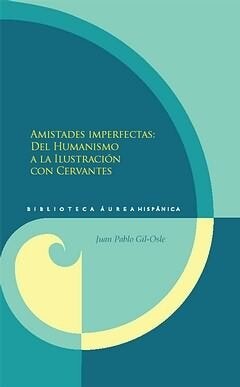Amistades Imperfectas: Del Humanismo a la Illustración con Cervantes
"Imperfect Friendship: From Humanism to Enlightenment with Cervantes" addresses the relationship between representations of male friendship (15th century to the Enlightenment) and images of friendship in the works of Cervantes.
Gil-Osle uses a twofold theory of male friendship as the foundation for his argument. On the one hand, classical, medieval, and Renaissance theories of friendship (Plato, Aristotle, Cicero, Saint Agustin, Rieval, Alberti, Ficino) support his analysis of the classical, ecclesiastic and humanistic tradition of amicitia within which Cervantes was writing. On the other, Cervantes’s representations of friendship are — at times — so atypical of the amicitia tradition, that they necessitate examination through enlightened models of social relationship and the idea of the individual (Hume, Adam Smith, Kant).
As a result, Cervantes appears as a key figure in the evolution of solidarity models from social organization to individualistic frameworks. This book shows the intellectual history of the notion of amicitia in a period that first began to develop the market logic, egoist theories, and family paradigms that occupy a large portion of our current political imaginary. Peninsular literature and cultures are presented in this book as fundamental to understanding the evolution of the notion of friendship in Europe.
Bio
Juan Pablo Gil-Osle is a faculty member with the School of International Letters and Cultures.


